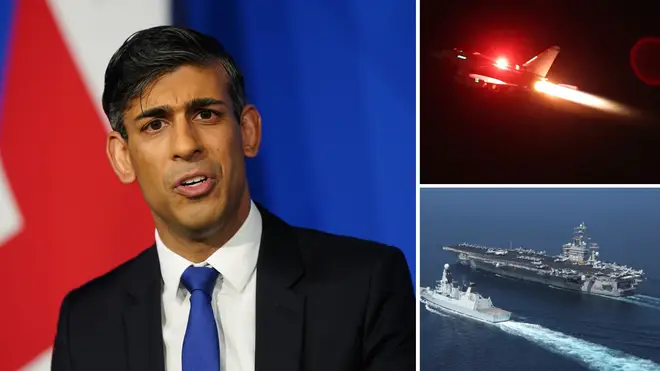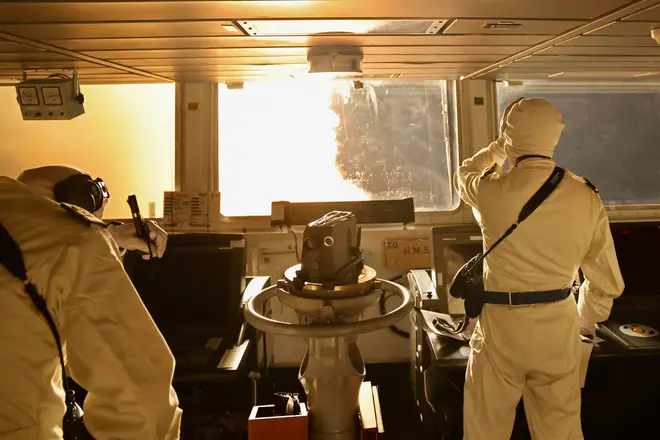
Nick Abbot 12am - 1am
11 January 2024, 23:53 | Updated: 12 January 2024, 05:33

Britain and the US have launched strikes against Iran-backed Houthi rebels in Yemen following disruption in the Red Sea.
The United States and Britain started carrying out the strikes against targets linked to Houthis in Yemen on Thursday evening.
More than a dozen sites used by the Iranian-backed group were targeted in the retaliatory move, using warship-launched Tomahawk missiles and fighter jets.
The Ministry of Defence (MoD) said coalition forces identified key facilities involved in Houthi targeting of HMS Diamond and US Navy vessels on Tuesday "and agreed to conduct a carefully coordinated strike to reduce the Houthis' capability to violate international law in this manner".
"Particular care was taken to minimise any risks to civilians," the MoD added.
It is the first time strikes have been launched against the Iran-backed group since it started targeting international shipping in the Red Sea late last year.
Rishi Sunak confirmed the strikes on Friday morning, saying in a statement that the UK will "always stand up for freedom of navigation and the free flow of trade".
"In recent months, the Houthi militia have carried out a series of dangerous and destabilising attacks against commercial shipping in the Red Sea, threatening UK and other international ships, causing major disruption to a vital trade route and driving up commodity prices," Mr Sunak said.
"Their reckless actions are risking lives at sea and exacerbating the humanitarian crisis in Yemen.
"Despite the repeated warnings from the international community, the Houthis have continued to carry out attacks in the Red Sea, including against UK and US warships just this week. This cannot stand.
"The United Kingdom will always stand up for freedom of navigation and the free flow of trade."
Live: Britain and US launch strikes against Houthi targets in Yemen
Read more: Who are the Houthi rebels and what has led to increased tensions in the Middle East?
Four @RoyalAirForce Typhoons have conducted precision strikes on two Houthi military targets alongside US forces.
— Rt Hon Grant Shapps MP (@grantshapps) January 12, 2024
The threat to innocent lives and global trade has become so great that this action was not only necessary, it was our duty to protect vessels & freedom of navigation pic.twitter.com/tbN7ncJYpF
Joe Biden said US military forces, backed by the UK and supported by Australia, Bahrain, Canada, and the Netherlands, successfully conducted strikes against a number of targets in Yemen.
"These strikes are in direct response to unprecedented Houthi attacks against international maritime vessels in the Red Sea - including the use of anti-ship ballistic missiles for the first time in history," he said in a statement.
"These attacks have endangered US personnel, civilian mariners, and our partners, jeopardised trade, and threatened freedom of navigation.
"More than 50 nations have been affected in 27 attacks on international commercial shipping."
A joint statement by 10 governments issued through the White House said they would "not hesitate to defend lives and protect the free flow of commerce in one of the world's most critical waterways".
Denmark, Germany, New Zealand and South Korea added their names to the six nations that took part in the joint strikes.
"The Houthis' more than two dozen attacks on commercial vessels since mid-November constitute an international challenge," they said.
"Today's action demonstrated a shared commitment to freedom of navigation, international commerce, and defending the lives of mariners from illegal and unjustifiable attacks."
But following the strikes, a high-ranking Houthi official, Ali al-Qahoum, warned: "The battle will be bigger.... and beyond the imagination and expectation of the Americans and the British."

Sir William Patey tells Ben Kentish 'there is a danger of miscalculation' of Iran's involvement with the Houthi rebels
Houthi rebels first started threatening shipping in response to Israel's invasion of Gaza, boarding a vessel and firing missiles at ships.
US Central Command, which controls American forces in the Middle East, said in an update on Thursday that the group had launched 27 attacks against commercial shipping in the Red Sea.
Addressing the retaliatory strikes on Friday, Defence Secretary Grant Shapps said: "Four @RoyalAirForce Typhoons have conducted precision strikes on two Houthi military targets alongside US forces.
"The threat to innocent lives and global trade has become so great that this action was not only necessary, it was our duty to protect vessels & freedom of navigation."
It comes after Mr Shapps warned on Wednesday: "The UK alongside allies have previously made clear that these illegal attacks are completely unacceptable and if continued the Houthis will bear the consequences.

"We will take the action needed to protect innocent lives and the global economy."
And US secretary of state Antony Blinken warned the same day: "We've been clear with more than 20 other countries that if this continues, as it did yesterday, there will be consequences. And I'm going to leave it at that."
Houthi leader Abdel-Malik al-Houthi warned: "Any American attack will not remain without a response. The response will be greater than the attack that was carried out with 20 drones and a number of missiles."
That was in reference to the strike which was repulsed by the UK and US ships. It was described as the group's biggest attack yet.
In November, the Houthis hijacked the Galaxy Leader cargo ship, claiming it was Israeli. Japan's government said it was actually operated by Nippon Yusen, a shipping company in Tokyo.
The group controls much of Yemen's west, including the coastline at the entrance to the Red Sea, after a series of civil wars.
It is avowedly anti-American and anti-Israeli, and says its attacks on shipping are designed to stop the Gaza invasion.
There are fears that if vessels are so badly affected they stop using the Suez Canal - which 12% of shipping passes through, shortening the travel time between Europe and Asia - the cost of goods could rise.
Now, the Houthis' backer Iran has seized an oil tanker in the Gulf of Oman.

Sailing under a Mashall Islands flag, the St Nikolas ship was boarded some 50 miles off the coast of Oman.
The area is transited by ships coming in and out of the Strait of Hormuz, the narrow mouth of the Persian Gulf through which a fifth of all oil traded passes.
The United Kingdom Maritime Trade Operations (UKTMO), which provides warnings to sailors in the region, described receiving a report from the ship’s security manager of hearing "unknown voices over the phone".
Iran's state media said the seizure came in response to the US confiscating the vessel, and its oil onboard, last year. Washington acted as part of its sanctions regime against Tehran.
Iranian media said it was an American ship, but it is actually Greek owned. Empire Navigation, the company that operates the ship, said it was carrying 145,000 tonnes of crude oil.
A total of 18 Filipinos and one Greek made up the crew.